
George Harrison was an English musician, singer and songwriter who achieved international fame as the lead guitarist of the Beatles. Sometimes called "the quiet Beatle", Harrison embraced Indian culture and helped broaden the scope of popular music through his incorporation of Indian instrumentation and Hindu-aligned spirituality in the Beatles' work.

Todd Harry Rundgren is an American musician, singer, songwriter, and record producer who has performed a diverse range of styles as a solo artist and as a member of the bands Nazz and Utopia. He is known for his sophisticated and often unorthodox music, his occasionally lavish stage shows, and his later experiments with interactive art. He also produced music videos and was an early adopter and promoter of various computer technologies, such as using the Internet as a means of music distribution in the late 1990s.

Straight Up is the fourth studio album by the Welsh rock band Badfinger, released in December 1971 in the United States and February 1972 in Britain. Issued on the Beatles' Apple record label, it includes the hit singles "Day After Day" and "Baby Blue", and the similarly popular "Name of the Game", all of which were written by singer and guitarist Pete Ham. The album marked a departure from the more rock-oriented sound of Badfinger's previous releases, partly as a result of intervention by Apple Records regarding the band's musical direction.

"Something" is a song by the English rock band the Beatles from their eleventh studio album Abbey Road (1969). It was written by George Harrison, the band's lead guitarist. Together with his second contribution to Abbey Road, "Here Comes the Sun", it is widely viewed by music historians as having marked Harrison's ascendancy as a composer to the level of the Beatles' principal songwriters, John Lennon and Paul McCartney. Two weeks after the album's release, the song was issued on a double A-side single, coupled with "Come Together", making it the first Harrison composition to become a Beatles A-side. The pairing was also the first time in the United Kingdom that the Beatles issued a single containing tracks already available on an album. While the single's commercial performance was lessened by this, it topped the Billboard Hot 100 in the United States as well as charts in Australia, Canada, New Zealand and West Germany, and peaked at number 4 in the UK.
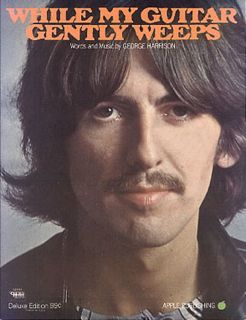
"While My Guitar Gently Weeps" is a song by the English rock band the Beatles from their 1968 double album The Beatles. It was written by George Harrison, the band's lead guitarist, as an exercise in randomness inspired by the Chinese I Ching. The song conveys his dismay at the world's unrealised potential for universal love, which he refers to as "the love there that's sleeping".
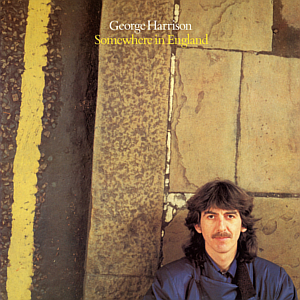
Somewhere in England is the ninth studio album by the English musician George Harrison, released on 1 June 1981 by Dark Horse Records. The album was recorded as Harrison was becoming increasingly frustrated with the music industry. The album's making was a long one, during which conflicts with Warner Bros. Records arose. Somewhere in England was the first Harrison album to be released after the murder of his former Beatle bandmate John Lennon; the lyrics of its first single, "All Those Years Ago", pay tribute to Lennon.

The Smithereens are an American rock band from Carteret, New Jersey. The group formed in 1980 with members Pat DiNizio, Jim Babjak, Mike Mesaros, and Dennis Diken. This original lineup continued until 2006, when Mesaros left the band and Severo Jornacion took over on bass guitar until Mesaros' return in 2016. After DiNizio died in 2017, the band continued performing live shows as a trio with various guest vocalists.
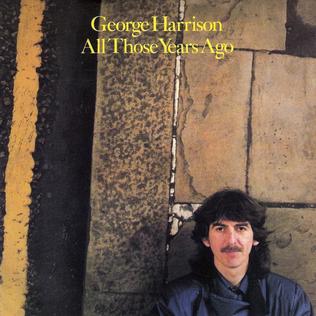
"All Those Years Ago" is a song by the English rock musician George Harrison, released in May 1981 as a single from his ninth studio album Somewhere in England. Having previously recorded the music for the song, Harrison tailored the lyrics to serve as a personal tribute to his former Beatles bandmate John Lennon, following the latter's murder in 1980. Ringo Starr is featured on drums, and Paul McCartney overdubbed backing vocals onto the basic track. The single spent three weeks at number 2 on the US Billboard Hot 100, behind "Bette Davis Eyes" by Kim Carnes, and it peaked at number 13 on the UK Singles Chart. It also topped Canada's RPM singles chart and spent one week at number 1 on Billboard's Adult Contemporary listings.

"Savoy Truffle" is a song by the English rock band the Beatles from their 1968 album The Beatles. The song was written by George Harrison and inspired by his friend Eric Clapton's fondness for chocolate. The lyrics list the various flavours offered in Mackintosh's Good News chocolates and serve as a warning to Clapton about the detrimental effect that his gorging would have on his teeth. Along with Clapton's guest appearance on the White Album track "While My Guitar Gently Weeps" and Harrison reciprocating on Cream's "Badge", it is one of several songs that mark the start of a long-lasting musical association between the two guitarists.

"Love You To" is a song by the English rock band the Beatles from their 1966 album Revolver. The song was written and sung by George Harrison and features Indian instrumentation such as sitar and tabla. Following Harrison's introduction of the sitar on "Norwegian Wood " in 1965, it was the first Beatles song to fully reflect the influence of Indian classical music. The recording was made with minimal participation from Harrison's bandmates; instead, he created the track with tabla player Anil Bhagwat and other Indian musicians from the Asian Music Circle in London.

"I Want to Tell You" is a song by the English rock band the Beatles from their 1966 album Revolver. It was written and sung by George Harrison, the band's lead guitarist. After "Taxman" and "Love You To", it was the third Harrison composition recorded for Revolver. Its inclusion on the LP marked the first time that he was allocated more than two songs on a Beatles album, a reflection of his continued growth as a songwriter beside John Lennon and Paul McCartney.

"If I Needed Someone" is a song by the English rock band the Beatles, written by George Harrison, the group's lead guitarist. It was released in December 1965 on their album Rubber Soul, except in North America, where it appeared on the June 1966 release Yesterday and Today. The song reflects the reciprocal influences shared between the Beatles and the American band the Byrds. On release, it was widely considered to be Harrison's best song to date. A recording by the Hollies was issued in Britain on the same day as Rubber Soul and peaked at number 20 on the national singles chart.

"Do You Want to Know a Secret" is a song by English rock band the Beatles from their 1963 album Please Please Me, sung by George Harrison. In the United States, it was the first top ten song to feature Harrison as a lead singer, reaching No. 2 on the Billboard chart in 1964 as a single released by Vee-Jay, VJ 587. In the UK, Billy J. Kramer released a cover of the song as his debut single, reaching No. 1 on the NME singles chart and No. 2 on the Record Retailer chart.
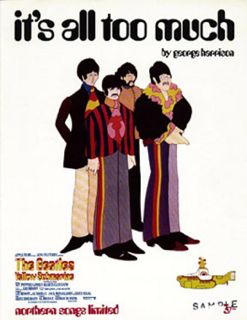
"It's All Too Much" is a song by the English rock band the Beatles from their 1969 album Yellow Submarine. Written by George Harrison in 1967, it conveys the ideological themes of that year's Summer of Love. The Beatles recorded the track in May 1967, a month after completing their album Sgt. Pepper's Lonely Hearts Club Band. It was one of four new songs they then supplied for the 1968 animated film Yellow Submarine, to meet their contractual obligations to United Artists.

"What Is Life" is a song by the English rock musician George Harrison from his 1970 triple album All Things Must Pass. In many countries, it was issued as the second single from the album, in February 1971, becoming a top-ten hit in the United States, Canada and elsewhere, and topping singles charts in Australia and Switzerland. In the United Kingdom, "What Is Life" appeared as the B-side to "My Sweet Lord", which was the best-selling single there of 1971. Harrison's backing musicians on the song include Eric Clapton and the entire Delaney & Bonnie and Friends band, with whom he had toured during the final months of the Beatles. Harrison co-produced the recording with Phil Spector, whose Wall of Sound production also employed a prominent string arrangement by John Barham and multiple acoustic rhythm guitars, played by Harrison's fellow Apple Records signings Badfinger.
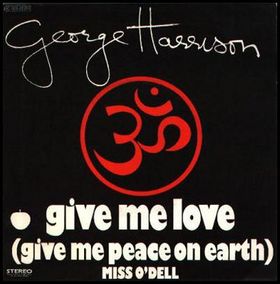
"Give Me Love (Give Me Peace on Earth)" is a song by English musician George Harrison, released as the opening track of his 1973 album Living in the Material World. It was also issued as the album's lead single, in May that year, and became Harrison's second US number 1, after "My Sweet Lord". In doing so, the song pushed Paul McCartney and Wings' "My Love" from the top of the Billboard Hot 100, marking the only occasion that two former Beatles have held the top two chart positions in America. The single also reached the top ten in Britain, Canada, Australia, and Holland.

"If Not for You" is a song by American singer-songwriter Bob Dylan from his October 1970 album New Morning. It was issued as the A-side of a single in Europe in early 1971. The song is a love song to Dylan's first wife, Sara Dylan. He recorded it several times in 1970; the session for the released version took place in New York in August. He also recorded the song with George Harrison on May 1, soon after the break-up of the Beatles, a session that attracted much speculation in the music press. The May recording remained unreleased until its inclusion on The Bootleg Series Volumes 1–3 in 1991.

"Isn't It a Pity" is a song by English rock musician George Harrison from his 1970 solo album All Things Must Pass. It appears in two variations there: one the well-known, seven-minute version; the other a reprise, titled "Isn't It a Pity (Version Two)". Harrison wrote the song in 1966, but it was rejected for inclusion on releases by the Beatles. In many countries around the world, the song was also issued on a double A-side single with "My Sweet Lord". In America, Billboard magazine listed it with "My Sweet Lord" when the single topped the Hot 100 chart, while in Canada, "Isn't It a Pity" reached number 1 as the preferred side.
"Life Itself" is a song by English musician George Harrison from his 1981 album Somewhere in England. Harrison also included it on his 1989 greatest-hits compilation Best of Dark Horse. As a love song to God, the track served as the artist's most overtly religious musical statement since 1974. The lyrics offer praise to Christ, Vishnu, Jehovah and Buddha, thereby marking a return to the concept of a universal deity, regardless of religious demarcation, that Harrison had first espoused in his 1970 hit single "My Sweet Lord".

Brother is the debut album by the American pop-rock duo Lon & Derrek Van Eaton. It was released on the Beatles' Apple record label in September 1972 in the United States and February 1973 in Britain. It includes the single "Sweet Music", produced by George Harrison, and was otherwise produced by Klaus Voormann, a friend and longtime associate of the Beatles. On release, the album received favorable reviews from music critics but failed to achieve commercial success. Rolling Stone critic Stephen Holden hailed it as a "staggeringly impressive first album".
















